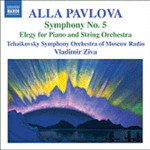
Elegy / Symphony No. 5
 $25.00
Out of Stock
$25.00
Out of Stock6+ weeks add to cart
ALLA PAVLOVA
Elegy / Symphony No. 5
Moscow Radio Tchaikovsky Symphony Orchestra / Vladimir Ziva
[ Naxos / CD ]
Release Date: Tuesday 15 May 2007
This item is currently out of stock. It may take 6 or more weeks to obtain from when you place your order as this is a specialist product.
"The recording is bright and forward in the usual Naxos style. The orchestral playing of the Tchaikovsky Symphony Orchestra of Moscow Radio is accomplished enough. It's good to hear that the former Moscow Radio Symphony Orchestra in its new guise and worth remembering that it premiered some of the greatest music to come out of Russia in the 20th century."
(MusicWeb May 2007)
Alla Pavlova is a composer and musicologist. In 1983 she received her Master's Degree at the Gnesin Academy of Music in Moscow. From 1983 to 1986 she lived in the Bulgarian capital Sofia, where she worked for the Union of Bulgarian Composers and the Bulgarian National Opera. From 1986 to 1989 she was in Moscow, working for the Russian Musical Society Board. Since 1990 she has lived in New York, where she is a member of New York Women Composers, Inc. Alla Pavlova has written a number of compositions for orchestra, including five symphonies and the ballet Sulamith (2003-2005), based on the 1908 story by the famous Russian writer Alexandre Kuprin about the love of King Solomon for Sulamith, a servant from his vineyard, as well as other instrumental and vocal works that have been performed in the United States, Europe and Canada.
Composer's Note
My Fifth Symphony was composed in the late autumn and winter of 2005-2006. As always, it was written the old-fashioned way, by hand. During the spring, I worked on the orchestral parts and in June the symphony was recorded by Tchaikovsky Symphony Orchestra of Moscow Radio.
The Fifth Symphony has a spiritual programme. One may imagine the whole work as in sonata-form. The first movement is the main theme, the second movement the second theme, the third movement the development, and the fourth and fifth movements have the spiritual rôle of a recapitulation; in fact they are two different 'finales'. one subjective, the other objective.
The first movement expresses my personal feelings about Life. In F sharp minor, it has three themes, an Introduction (Adagio), a first (Vivace) and a second (Adagio). After the exposition of the themes, the second theme continues its development. It is possible to say that the development section is based on the second theme which step by step regenerates into the first theme (in character, tempo and musical material). The recapitulation is a further development of the first theme. There are many modulations. The most important are: F sharp - F - B flat - E - D - F sharp minors.
In the second movement the mind escapes reality through deep meditation into the beautiful, magnificent micro-world of a white lotus flower. The second movement, in F minor, Adagio, is based on new independent musical material. In the very beginning there is a kind of compromise between two keys, F minor and E minor. It is a hint for the future tonal plan of the symphony. There are several important modulations, but the movement starts and ends in F minor. The violin solos are very important in the three inner movements, the second, third and fourth.
For the third movement the real world comes back with a lonely outcry. Marked Adagio - Vivace, it is a further development of the Introduction and first theme from the first movement, along with some new material. It starts in F minor, goes through several modulations (such as : F - C - E flat - C sharp - F sharp - E minors) and ends in E major. The violin solo is the point where the symphony reaches its tragic emotional climax.
The fourth and fifth movements, Largoand Vivace, introduce new musical material. The fourth is based on E minor and the fifth on D minor. It is as precious as the last moments of one's life when one speaks with the Lord. And finally, the recognition in the fifth movement that the miracle of Life is greater than our emotions and theories and therefore the Path of Life is the Goal.
The orchestration of the symphony is lighter and simpler than that of my previous symphonies for full orchestra. The only brass instruments are the horns. There is much less percussion. Strings are the foundation of the score and the violin solos are particularly important.
Elegy, for piano and string orchestra, was written as a project for the main title for a film, The American Healys (1998), a tragic love story based on the life of Michael Healy, who defies the laws of Georgia by marrying his black slave. In 1999 it was recorded in Moscow, along with other orchestral works, by the International Symphony Orchestra "Globalis", with the conductor Konstantin Krimets, and the pianist Peter Izotov, released by Albany in 2000.
Alla Pavlova
Tracks:
Elegy
Symphony No. 5



